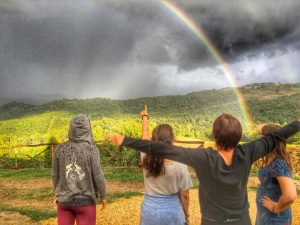CW: This essay discusses sexual aggression and assault.
By Jeanne Lyet Gassman
So, good gentlemen, since we’re talking about sexual assault, it’s time for you to ask the question. Go ahead. Ask. Ask your wife, your girlfriend, your daughter, your sister, your friend, if she’s ever been sexually assaulted.
Her answer may surprise you. When the author and comedian Kelly Oxford posted the hashtag #notokay on Twitter on October 7, 2016 after the leaked Donald Trump video from the show, Access Hollywood, she asked women to share the first time they were sexually assaulted, and she received over 9.7 million responses. Gentlemen, odds are pretty good that you know a woman who has been sexually assaulted.
Note that Kelly Oxford asked women to post the first time they were sexually assaulted, implying there was a second, third, fourth, or many times. Think about that for a moment, then ask the woman you know how many times she’s been groped, fondled, or assaulted. Her answers may shock you.
Sexual assault is never about sex. It’s about power and the abuse of that power. The male sexual predator selects his victim for her vulnerability: The boss who gropes his assistant in his private office (a cliché, I know, but true). The trusted family member who preys upon a young female relative. The coach who abuses his authority with female team members. That stranger at a party who targets the drunken woman when she is alone.
Gentlemen, take the time to scroll through a few of those 9.7 million tweets and read them. You will hear a similar refrain. Again and again, women share their first time: I was seventeen… I was twelve…eight… four. These victims were not simply women but children. Yes, children like your little sister or your daughter. They were not old enough to defend themselves or even understand what was happening, but an adult man or a near-adult male, such as a teenager, felt it was his right to sexually assault them.
My story: I was eight years old the first time I was sexually assaulted. He worked in the office next to my father’s business. When I told my mother what this man did, she said, “Don’t tell your father. He’ll want to kill the man.” But she did tell my father for me, and my father got him fired. Just not soon enough.
Sexual predators look for the powerless. When a predator is caught, if he is not punished, he will find another victim, one who is perhaps less well-protected. Before my predator lost his job, he victimized another girl.
I knew her. I tried to warn her when I saw her visiting his office. “Don’t go in there,” I told her. “He’s not a nice man. Don’t be alone with him. He’ll hurt you.” But she didn’t believe me, didn’t understand. “He is too nice,” she insisted. “He gives me candy. You’re just jealous.”
She was only four years old.
Her parents didn’t believe her when she finally told. The predator was a friend of their family. He would never do anything like that. She just wanted attention. After my predator was fired, she and I lost touch, but I learned later that another male raped her when she was twelve. Her rapist was twenty, and he was her step-brother. I was lucky. She wasn’t.
If sexual assault is so prevalent and so horrible, why don’t women tell? Why don’t they report it? This is certainly a charge that has been promoted by the defenders of Donald Trump: Why are all these women just now coming forward? Why didn’t they say something when it happened? And, of course, the implicit meaning is that they must be lying because they waited so long to say anything.
But there is something known as “the bubble of safety.” When one or more victims shares her story, others feel safe enough to speak out for the first time.
Women don’t tell for so many reasons.
We don’t tell because we are afraid. Our abuser may have threatened us or our family.
We don’t tell because we are ashamed.
We don’t tell because we feel it’s our fault. We shouldn’t have worn that dress, smiled at him, accepted that offer of a drink.
We don’t tell because we think no one will believe us.
We don’t tell because we don’t want to lose our job.
We don’t tell because it was too awful to think about, and we just want to forget.
You may wonder then, how do we cope? Do we, as women, simply travel through life bouncing from one sexual assault to another? Not necessarily. Most of us begin to develop a sort of predator radar where we can sense dangerous situations and dangerous men. We dodge and deflect and avoid being alone in the wrong place or with the wrong person. But it doesn’t always work.
The second time I was assaulted I was nineteen and employed at my first real job the summer after my freshman year of college. I was a desk clerk for a motel in a busy tourist area where I took reservations, managed the switchboard, and supervised the cleaning staff. My boss and his wife lived on the premises in a small apartment behind the front office.
Summer was the peak season, and vacations were impossible, so when my boss’s wife left town to care for her ill sister for a few days, my boss asked me to pick up extra hours. In the past, he had made comments when his wife wasn’t around. You know, those creepy statements posed as a compliment but meaning so much more: “That dress really shows off your legs.” Or: “I like your lipstick. It makes your lips look very kissable.”
I knew. I knew what was coming the night he asked me to stay late. I knew he would make his move, but I needed the money for college. And I thought I was smart, that I could dodge the grabby hands by staying close to the front desk in a public place. But he was older and smarter than me. He asked me to bring him a file, and as I passed through the door, he pulled me down and kissed me. I pushed him away and jumped to my feet just as someone rang the bell at the front desk.
He never touched me again, and his wife returned a few days later. I was lucky.
Predators look for opportunity. They want no witnesses so they prefer their victims to be isolated and alone. And sexual predators are patient. They will wait and watch until the perfect moment arrives.
I was twenty-one when I had my first and last brush with near-rape. Still working my way through college, I attended the desk in the library where I checked materials in and out, shelved books, and answered questions. Again, it was a position that required constant interaction with the public. One member of that public was my next predator. He liked to hang out by the front counter, looking for excuses to talk to me. But my predator radar told me he was not to be trusted. He was too quick to touch my arm, too aggressive in his manner. I rejected every request for coffee with excuses: “I have to work. I have a paper due. I’m supposed to meet friends. I have an orchestra rehearsal.” I never gave him my phone number or my address. I thought I was safe.
I wasn’t.
I was alone in the dorm basement on a Friday night, doing my laundry, when he walked in. Much taller than me at six foot two, he easily swept my laundry basket from my arms and dropped it to the floor. As I backed away, he leaned over me and gripped me by the back of the neck. His fingers squeezed lightly. A warning. “I’ve been asking you out for weeks,” he said, “and you’re always busy. The laundry can wait. Let’s go get a coffee.”
Fight or flight? That is the question, isn’t it? But all I could feel was those powerful fingers squeezing. I knew if I fought, he would think nothing of choking me. I used my wits, my words spinning as fast as my thoughts. “Oh, I can’t, not tonight. Maybe tomorrow. I’m supposed to meet a friend soon to study for a test, and she’ll be upset if I don’t come…”
He laughed. I will never forget the fear that gripped me while he steered me toward the door.
Then a miracle happened. Another dorm resident walked in with her laundry. I grabbed her arm and babbled on about our upcoming test. She knew. Her sexual predator radar kicked in, and she followed my lead, asking me to join her in her room to study. My predator, defeated by witnesses and two women, left.
A couple of days later, a male friend, a campus cop, warned me not to go out with the man. “He’s been accused of rape twice,” he said. “Stay away from him. We’re investigating him to see if we can bring charges.”
But sexual predators keep looking for new victims until they’re caught. This man took another member of the library staff out for “coffee.” She came to work with a black eye, and when I asked her what had happened, she said, “I fell.” Women don’t tell when they’re afraid.
I was lucky. He was charged with rape by a third victim. The staff member who went out for coffee with him left school, and I never saw her again.
So, fair gentlemen, you may feel that women think all men are predators. Not true. Many of us have good men in our lives, men who respect us, men who do not abuse us, men who would never speak about us in the way Donald Trump spoke. And we love you and thank you for that.
But, you ask, what can you do? What can you do to change the status quo? If you love and respect the women in your life, how can you make the world a safer place? How can you contribute to an environment where a woman no longer needs to rely on her sexual predator radar?
Begin, gentlemen, by speaking up. You’ve heard the gossip. It may be in a locker room or at a bar or at a pickup basketball game, but you’ve heard men use the words Donald Trump uses. You’ve heard other men brag about their conquests. When you remain silent, you are complicit. You are condoning criminal behavior.
Women are not prizes to be won or conquered. Women are human beings with value and needs.
Go ahead. Ask the woman in your life the question: When were you first sexually assaulted? And when she tells you her stories, listen. You will learn something.

Next one after this is NYC Feb 4 at Pure Yoga West. You don’t need to be a yogi at all. Just be a human. Click photo to book.

